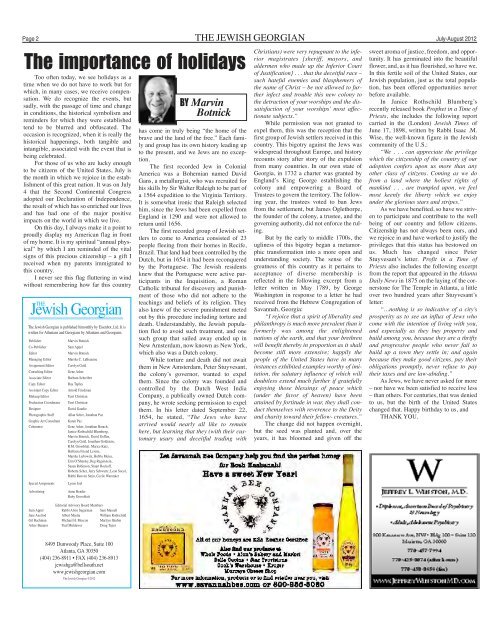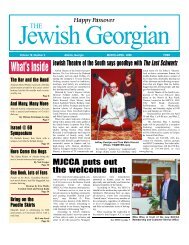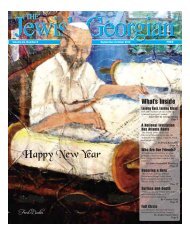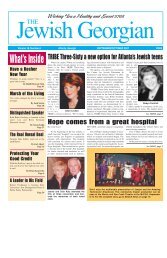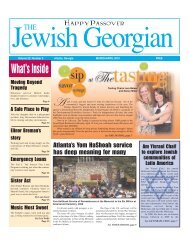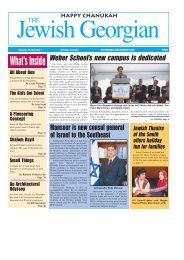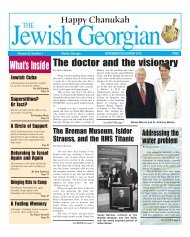FEDERATION NEWS - The Jewish Georgian
FEDERATION NEWS - The Jewish Georgian
FEDERATION NEWS - The Jewish Georgian
Create successful ePaper yourself
Turn your PDF publications into a flip-book with our unique Google optimized e-Paper software.
Page 2 THE JEWISH GEORGIAN July-August 2012<br />
<strong>The</strong> importance of holidays<br />
Too often today, we see holidays as a<br />
time when we do not have to work but for<br />
which, in many cases, we receive compensation.<br />
We do recognize the events, but<br />
sadly, with the passage of time and change<br />
in conditions, the historical symbolism and<br />
reminders for which they were established<br />
tend to be blurred and obfuscated. <strong>The</strong><br />
occasion is recognized, when it is really the<br />
historical happenings, both tangible and<br />
intangible, associated with the event that is<br />
being celebrated.<br />
For those of us who are lucky enough<br />
to be citizens of the United States, July is<br />
the month in which we rejoice in the establishment<br />
of this great nation. It was on July<br />
4 that the Second Continental Congress<br />
adopted our Declaration of Independence,<br />
the result of which has so enriched our lives<br />
and has had one of the major positive<br />
impacts on the world in which we live.<br />
On this day, I always make it a point to<br />
proudly display my American flag in front<br />
of my home. It is my spiritual “annual physical”<br />
by which I am reminded of the vital<br />
signs of this precious citizenship – a gift I<br />
received when my parents immigrated to<br />
this country.<br />
I never see this flag fluttering in wind<br />
without remembering how far this country<br />
THE<br />
<strong>Jewish</strong> <strong>Georgian</strong><br />
<strong>The</strong> <strong>Jewish</strong> <strong>Georgian</strong> is published bimonthly by Eisenbot, Ltd. It is<br />
written for Atlantans and <strong>Georgian</strong>s by Atlantans and <strong>Georgian</strong>s.<br />
Publisher Marvin Botnick<br />
Co-Publisher Sam Appel<br />
Editor Marvin Botnick<br />
Managing Editor Marsha C. LaBeaume<br />
Assignment Editor Carolyn Gold<br />
Consulting Editor Gene Asher<br />
Associate Editor Barbara Schreiber<br />
Copy Editor Ray Tapley<br />
Assistant Copy Editor Arnold Friedman<br />
Makeup Editor Terri Christian<br />
Production Coordinator Terri Christian<br />
Designer David Gaudio<br />
Photographic Staff Allan Scher, Jonathan Paz<br />
Graphic Art Consultant Karen Paz<br />
Columnist Gene Asher, Jonathan Barach,<br />
Janice Rothschild Blumberg,<br />
Marvin Botnick, David Geffen,<br />
Carolyn Gold, Jonathan Goldstein,<br />
R.M. Grossblatt, Marice Katz,<br />
Balfoura Friend Levine,<br />
Marsha Liebowitz, Bubba Meisa,<br />
Erin O’Shinsky, Reg Regenstein,<br />
Susan Robinson, Stuart Rockoff,<br />
Roberta Scher, Jerry Schwartz, Leon Socol,<br />
Rabbi Reuven Stein, Cecile Waronker<br />
Special Assignments Lyons Joel<br />
Advertising Anne Bender<br />
Ruby Grossblatt<br />
Editorial Advisory Board Members<br />
Sam Appel Rabbi Alvin Sugarman Sam Massell<br />
Jane Axelrod Albert Maslia William Rothschild<br />
Gil Bachman Michael H. Mescon Marilyn Shubin<br />
Asher Benator Paul Muldawer Doug Teper<br />
8495 Dunwoody Place, Suite 100<br />
Atlanta, GA 30350<br />
(404) 236-8911 • FAX (404) 236-8913<br />
jewishga@bellsouth.net<br />
www.jewishgeorgian.com<br />
<strong>The</strong> <strong>Jewish</strong> <strong>Georgian</strong> ©2012<br />
BY<br />
Marvin<br />
Botnick<br />
has come in truly being “the home of the<br />
brave and the land of the free.” Each family<br />
and group has its own history leading up<br />
to the present, and we Jews are no exception.<br />
<strong>The</strong> first recorded Jew in Colonial<br />
America was a Bohemian named David<br />
Gans, a metallurgist, who was recruited for<br />
his skills by Sir Walter Raleigh to be part of<br />
a 1564 expedition to the Virginia Territory.<br />
It is somewhat ironic that Raleigh selected<br />
him, since the Jews had been expelled from<br />
England in 1290 and were not allowed to<br />
return until 1656.<br />
<strong>The</strong> first recorded group of <strong>Jewish</strong> settlers<br />
to come to America consisted of 23<br />
people fleeing from their homes in Recife,<br />
Brazil. That land had been controlled by the<br />
Dutch, but in 1654 it had been reconquered<br />
by the Portuguese. <strong>The</strong> <strong>Jewish</strong> residents<br />
knew that the Portuguese were active participants<br />
in the Inquisition, a Roman<br />
Catholic tribunal for discovery and punishment<br />
of those who did not adhere to the<br />
teachings and beliefs of its religion. <strong>The</strong>y<br />
also knew of the severe punishment meted<br />
out by this procedure including torture and<br />
death. Understandably, the <strong>Jewish</strong> population<br />
fled to avoid such treatment, and one<br />
such group that sailed away ended up in<br />
New Amsterdam, now known as New York,<br />
which also was a Dutch colony.<br />
While torture and death did not await<br />
them in New Amsterdam, Peter Stuyvesant,<br />
the colony’s governor, wanted to expel<br />
them. Since the colony was founded and<br />
controlled by the Dutch West India<br />
Company, a publically owned Dutch company,<br />
he wrote seeking permission to expel<br />
them. In his letter dated September 22,<br />
1654, he stated, “<strong>The</strong> Jews who have<br />
arrived would nearly all like to remain<br />
here, but learning that they (with their customary<br />
usury and deceitful trading with<br />
Christians) were very repugnant to the inferior<br />
magistrates [sheriff, mayors, and<br />
aldermen who made up the Inferior Court<br />
of Justification] . . . that the deceitful race –<br />
such hateful enemies and blasphemers of<br />
the name of Christ – be not allowed to further<br />
infect and trouble this new colony to<br />
the detraction of your worships and the dissatisfaction<br />
of your worships’ most affectionate<br />
subjects.”<br />
While permission was not granted to<br />
expel them, this was the reception that the<br />
first group of <strong>Jewish</strong> settlers received in this<br />
country. This bigotry against the Jews was<br />
widespread throughout Europe, and history<br />
recounts story after story of the expulsion<br />
from many countries. In our own state of<br />
Georgia, in 1732 a charter was granted by<br />
England’s King George establishing the<br />
colony and empowering a Board of<br />
Trustees to govern the territory. <strong>The</strong> following<br />
year, the trustees voted to ban Jews<br />
from the settlement, but James Oglethorpe,<br />
the founder of the colony, a trustee, and the<br />
governing authority, did not enforce the ruling.<br />
But by the early to middle 1700s, the<br />
ugliness of this bigotry began a metamorphic<br />
transformation into a more open and<br />
understanding society. <strong>The</strong> sense of the<br />
greatness of this country as it pertains to<br />
acceptance of diverse membership is<br />
reflected in the following excerpt from a<br />
letter written in May 1789, by George<br />
Washington in response to a letter he had<br />
received from the Hebrew Congregation of<br />
Savannah, Georgia:<br />
“I rejoice that a spirit of liberality and<br />
philanthropy is much more prevalent than it<br />
formerly was among the enlightened<br />
nations of the earth, and that your brethren<br />
will benefit thereby in proportion as it shall<br />
become still more extensive; happily the<br />
people of the United States have in many<br />
instances exhibited examples worthy of imitation,<br />
the salutary influence of which will<br />
doubtless extend much farther if gratefully<br />
enjoying those blessings of peace which<br />
(under the favor of heaven) have been<br />
attained by fortitude in war, they shall conduct<br />
themselves with reverence to the Deity<br />
and charity toward their fellow- creatures.”<br />
<strong>The</strong> change did not happen overnight,<br />
but the seed was planted and, over the<br />
years, it has bloomed and given off the<br />
sweet aroma of justice, freedom, and opportunity.<br />
It has germinated into the beautiful<br />
flower, and, as it has flourished, so have we.<br />
In this fertile soil of the United States, our<br />
<strong>Jewish</strong> population, just as the total population,<br />
has been offered opportunities never<br />
before available.<br />
In Janice Rothschild Blumberg’s<br />
recently released book Prophet in a Time of<br />
Priests, she includes the following report<br />
carried in the (London) <strong>Jewish</strong> Times of<br />
June 17, 1898, written by Rabbi Isaac .M.<br />
Wise, the well-known figure in the <strong>Jewish</strong><br />
community of the U.S.:<br />
“We . . . can appreciate the privilege<br />
which the citizenship of the country of our<br />
adoption confers upon us more than any<br />
other class of citizens. Coming as we do<br />
from a land where the holiest rights of<br />
mankind . . . are trampled upon, we feel<br />
most keenly the liberty which we enjoy<br />
under the glorious stars and stripes.”<br />
As we have benefited, so have we striven<br />
to participate and contribute to the well<br />
being of our country and fellow citizens.<br />
Citizenship has not always been ours, and<br />
we rejoice in and have worked to justify the<br />
privileges that this status has bestowed on<br />
us. Much has changed since Peter<br />
Stuyvesant’s letter. Profit in a Time of<br />
Priests also includes the following excerpt<br />
from the report that appeared in the Atlanta<br />
Daily News in 1875 on the laying of the cornerstone<br />
for <strong>The</strong> Temple in Atlanta, a little<br />
over two hundred years after Stuyvesant’s<br />
letter:<br />
“…nothing is so indicative of a city’s<br />
prosperity as to see an influx of Jews who<br />
come with the intention of living with you,<br />
and especially as they buy property and<br />
build among you, because they are a thrifty<br />
and progressive people who never fail to<br />
build up a town they settle in; and again<br />
because they make good citizens, pay their<br />
obligations promptly, never refuse to pay<br />
their taxes and are law-abiding.”<br />
As Jews, we have never asked for more<br />
– nor have we been satisfied to receive less<br />
– than others. For centuries, that was denied<br />
to us, but the birth of the United States<br />
changed that. Happy birthday to us, and<br />
THANK YOU.


